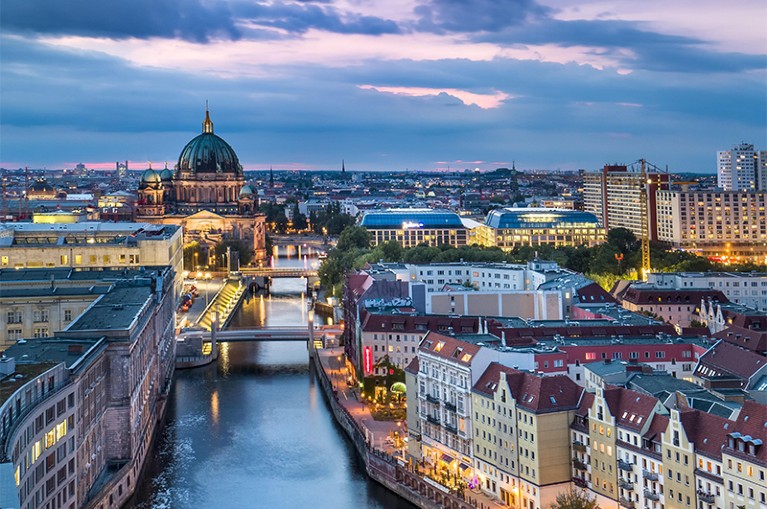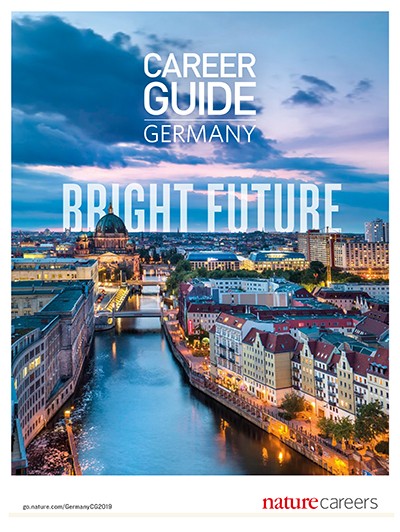
Berlin’s cathedral stands above a rapidly changing city.Credit: Sabine Lubenow/imageBROKER/Getty
In 2018, the year in which the Berlin Wall has now been down for longer than it was up, former physicist Angela Merkel announced that her fourth term as Germany’s chancellor would be her last.
Merkel’s political career has run parallel with her country’s evolution into a high-tech economy since reunification in 1990. A journey that has made Germany the third most popular destination for scientists from abroad, behind the United States and Great Britain.
In this supplement, we learn more about Germany’s ambitious manufacturing and innovation goals, what makes its research landscape unique and why researchers are drawn to the country.
As Germany’s scientific community has become more diverse, the opportunity for scientists with an entrepreneurial spirit has grown. In the World Economic Forum’s Global Competitiveness Report 2018, Germany was judged the world’s most innovative economy as a result of the country’s high volume of ideas — it generates nearly 300 patent applications per million people — and its ability to rapidly turn concepts into commercial products. We take a look at this trend. In addition, the country’s research scene is flourishing; it now ranks above the United States in terms of the number of manuscripts that appear in the top 10% most highly cited papers in the world.
On a practical note, it’s not hard to understand the attraction of moving your research career to Germany. The world’s fourth-largest economy offers its citizens a free higher education system, excellent quality of life and levels of inequality that are lower than in most other wealthy countries. Not to mention its reputation as a world leader in scientific research — coupled with a substantial collection of public promises to stay that way.
In 2016, for example, 32,000 foreign researchers were welcomed to Germany, mostly from Western Europe, Russia, China and India. This is a number that government officials think could increase given the current political developments in the United States, as well as the United Kingdom’s plan to leave the European Union.
We look at how Germany has proactively handled Europe’s migration and refugee crisis, and we examine the country’s approach to the world’s climate in terms of its research into green energy. We also delve into Germany’s contribution to the global science scene.
The country is also modernizing its institutions to help career scientists. You can read about how scientists are challenging patriarchy in Germany’s research scene.
With such widespread support for research, there is every reason to think that Mrs Merkel won’t be the last scientist to lead Germany.


 An introduction to the complexities of the German research scene
An introduction to the complexities of the German research scene
 How Germany is winning at turning its research to commercial application
How Germany is winning at turning its research to commercial application
 Ten reasons to move to Germany as a researcher
Ten reasons to move to Germany as a researcher
 Scientists in Germany identify first hybrid hominin
Scientists in Germany identify first hybrid hominin
 The science of starting a new life
The science of starting a new life
 British chemist battles xenophobia in Germany
British chemist battles xenophobia in Germany
 Germany faces its future as a pioneer in sustainability and renewable energy
Germany faces its future as a pioneer in sustainability and renewable energy
 The second coming of solar
The second coming of solar
 Ten research collaborations between Germany and the rest of the world
Ten research collaborations between Germany and the rest of the world
 Sexism is still a problem for German research
Sexism is still a problem for German research
 Preceded by 967 men: meet the first woman in charge of the 600-year-old Leipzig University
Preceded by 967 men: meet the first woman in charge of the 600-year-old Leipzig University
 Germany’s attitude to start-up firms is undergoing profound change
Germany’s attitude to start-up firms is undergoing profound change
 No more career headaches
No more career headaches








